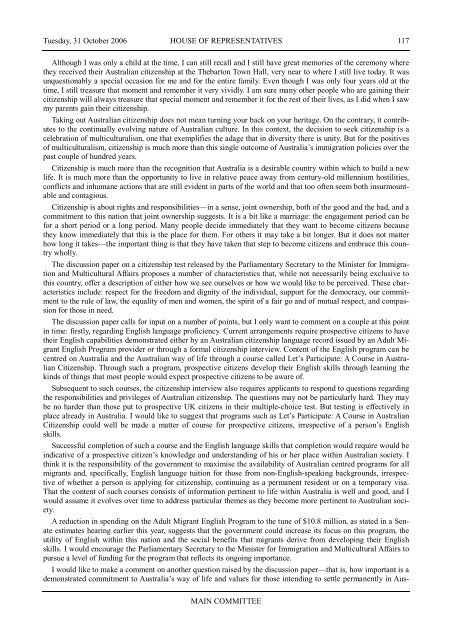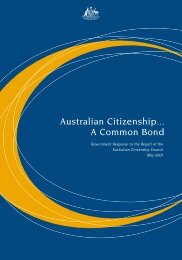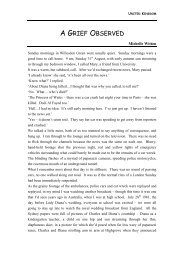HOUSE OF REPRESENTATIVES - The Southern Cross Group
HOUSE OF REPRESENTATIVES - The Southern Cross Group
HOUSE OF REPRESENTATIVES - The Southern Cross Group
Create successful ePaper yourself
Turn your PDF publications into a flip-book with our unique Google optimized e-Paper software.
Tuesday, 31 October 2006 <strong>HOUSE</strong> <strong>OF</strong> <strong>REPRESENTATIVES</strong> 117<br />
Although I was only a child at the time, I can still recall and I still have great memories of the ceremony where<br />
they received their Australian citizenship at the <strong>The</strong>barton Town Hall, very near to where I still live today. It was<br />
unquestionably a special occasion for me and for the entire family. Even though I was only four years old at the<br />
time, I still treasure that moment and remember it very vividly. I am sure many other people who are gaining their<br />
citizenship will always treasure that special moment and remember it for the rest of their lives, as I did when I saw<br />
my parents gain their citizenship.<br />
Taking out Australian citizenship does not mean turning your back on your heritage. On the contrary, it contributes<br />
to the continually evolving nature of Australian culture. In this context, the decision to seek citizenship is a<br />
celebration of multiculturalism, one that exemplifies the adage that in diversity there is unity. But for the positives<br />
of multiculturalism, citizenship is much more than this single outcome of Australia’s immigration policies over the<br />
past couple of hundred years.<br />
Citizenship is much more than the recognition that Australia is a desirable country within which to build a new<br />
life. It is much more than the opportunity to live in relative peace away from century-old millennium hostilities,<br />
conflicts and inhumane actions that are still evident in parts of the world and that too often seem both insurmountable<br />
and contagious.<br />
Citizenship is about rights and responsibilities—in a sense, joint ownership, both of the good and the bad, and a<br />
commitment to this nation that joint ownership suggests. It is a bit like a marriage: the engagement period can be<br />
for a short period or a long period. Many people decide immediately that they want to become citizens because<br />
they know immediately that this is the place for them. For others it may take a bit longer. But it does not matter<br />
how long it takes—the important thing is that they have taken that step to become citizens and embrace this country<br />
wholly.<br />
<strong>The</strong> discussion paper on a citizenship test released by the Parliamentary Secretary to the Minister for Immigration<br />
and Multicultural Affairs proposes a number of characteristics that, while not necessarily being exclusive to<br />
this country, offer a description of either how we see ourselves or how we would like to be perceived. <strong>The</strong>se characteristics<br />
include: respect for the freedom and dignity of the individual, support for the democracy, our commitment<br />
to the rule of law, the equality of men and women, the spirit of a fair go and of mutual respect, and compassion<br />
for those in need.<br />
<strong>The</strong> discussion paper calls for input on a number of points, but I only want to comment on a couple at this point<br />
in time: firstly, regarding English language proficiency. Current arrangements require prospective citizens to have<br />
their English capabilities demonstrated either by an Australian citizenship language record issued by an Adult Migrant<br />
English Program provider or through a formal citizenship interview. Content of the English program can be<br />
centred on Australia and the Australian way of life through a course called Let’s Participate: A Course in Australian<br />
Citizenship. Through such a program, prospective citizens develop their English skills through learning the<br />
kinds of things that most people would expect prospective citizens to be aware of.<br />
Subsequent to such courses, the citizenship interview also requires applicants to respond to questions regarding<br />
the responsibilities and privileges of Australian citizenship. <strong>The</strong> questions may not be particularly hard. <strong>The</strong>y may<br />
be no harder than those put to prospective UK citizens in their multiple-choice test. But testing is effectively in<br />
place already in Australia. I would like to suggest that programs such as Let’s Participate: A Course in Australian<br />
Citizenship could well be made a matter of course for prospective citizens, irrespective of a person’s English<br />
skills.<br />
Successful completion of such a course and the English language skills that completion would require would be<br />
indicative of a prospective citizen’s knowledge and understanding of his or her place within Australian society. I<br />
think it is the responsibility of the government to maximise the availability of Australian centred programs for all<br />
migrants and, specifically, English language tuition for those from non-English-speaking backgrounds, irrespective<br />
of whether a person is applying for citizenship, continuing as a permanent resident or on a temporary visa.<br />
That the content of such courses consists of information pertinent to life within Australia is well and good, and I<br />
would assume it evolves over time to address particular themes as they become more pertinent to Australian society.<br />
A reduction in spending on the Adult Migrant English Program to the tune of $10.8 million, as stated in a Senate<br />
estimates hearing earlier this year, suggests that the government could increase its focus on this program, the<br />
utility of English within this nation and the social benefits that migrants derive from developing their English<br />
skills. I would encourage the Parliamentary Secretary to the Minister for Immigration and Multicultural Affairs to<br />
pursue a level of funding for the program that reflects its ongoing importance.<br />
I would like to make a comment on another question raised by the discussion paper—that is, how important is a<br />
demonstrated commitment to Australia’s way of life and values for those intending to settle permanently in Aus-<br />
MAIN COMMITTEE




